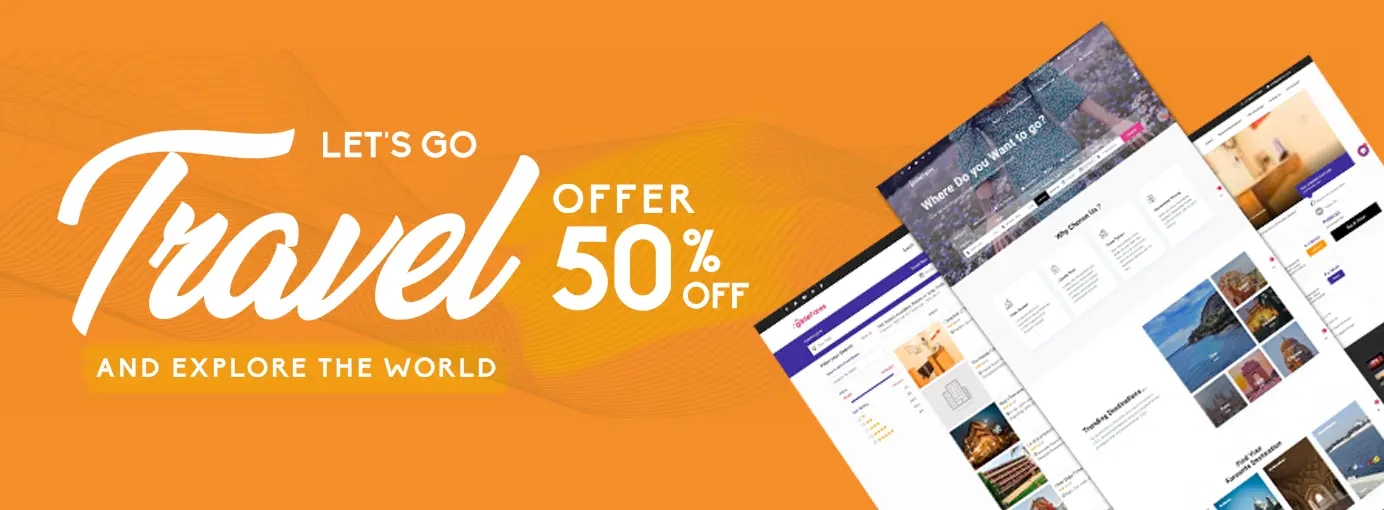Ready to go-LIVE travel solutions that helps your travel agency to sell a range of travel services pretty instantly. adivaha® travel solutions make sure you have no boundation over your imagination, you can do everything online, without the need for any technical knowledge or design skills. Easy Backoffice, extensive reporting with integrated Funds Management System.
Online Travel Portal Development: Revolutionizing Travel Bookings

In today’s fast-paced travel industry, having a robust and intuitive online travel portal is essential for businesses that want to stay competitive. Online travel portal development allows travel agencies and businesses to offer their customers real-time booking capabilities, dynamic pricing, and easy payment solutions. With an integrated platform, businesses can provide seamless access to various travel services such as flights, hotels, car rentals, and tour packages. These portals are designed to improve operational efficiency, increase customer satisfaction, and ultimately boost profits. To learn more about travel portal development, visit our Travel Portal Development page.

Why Online Travel Portal Development is Crucial for Your Business
With the growing demand for travel services, it’s no longer enough to simply rely on traditional methods. The need for an efficient, modern, and scalable system for handling bookings is essential. Online travel portal development allows businesses to access a wide range of services and provide a personalized experience for their customers. Real-time bookings, secure payment systems, and an intuitive user interface are just some of the many benefits that come with a well-designed travel portal. The integration of global distribution systems (GDS) and third-party services enhances the offerings, making it easier for businesses to scale and reach a global customer base.
- Real-time booking and instant confirmation for customers
- Secure payment gateway integration for smooth transactions
- Multi-currency and multi-language support for a global reach
- Seamless integration with third-party services for enhanced offerings
Online travel portal development ensures that businesses can remain competitive by offering an integrated solution that allows users to browse, compare, and book services from a single platform. This type of development helps to automate processes, reduce human error, and ultimately enhance the customer experience. Furthermore, with dynamic pricing and real-time availability, businesses can offer competitive prices and ensure that customers are always able to access the best deals.

Key Features of an Online Travel Portal
A fully functional online travel portal comes with a variety of features designed to enhance both the backend management and frontend customer experience. Here are some essential features you can expect:
- Real-Time Booking Engine: Enables customers to check availability, make instant bookings, and receive confirmations in real-time.
- Dynamic Pricing: Adjusts prices based on demand, availability, and seasonality, ensuring competitive pricing at all times.
- Multi-Currency and Multi-Language Support: Expands your business's reach to a global audience by supporting various currencies and languages.
- GDS and API Integration: Connects the portal with global distribution systems (GDS) and third-party APIs to offer a wider range of services.
- Customer Management System: Helps businesses track customer profiles, preferences, and booking histories, enabling personalized services.
- Secure Payment Gateways: Ensures that all transactions are processed securely, with support for various payment options.
With these features, businesses can offer a comprehensive solution for managing travel services, while improving both operational efficiency and customer satisfaction. These portals also provide the flexibility to scale, allowing businesses to grow and adapt to changing market conditions.

FAQs
Q1: What is an online travel portal?
An online travel portal is a web-based platform that allows users to search, compare, and book various travel services such as flights, hotels, car rentals, and tours.
Q2: How does an online travel portal benefit my business?
It streamlines booking processes, reduces manual efforts, and offers real-time booking capabilities, which increases efficiency, enhances customer satisfaction, and drives more sales.
Q3: Can I integrate third-party services into my travel portal?
Yes, travel portals can be integrated with Global Distribution Systems (GDS), third-party APIs, and various service providers to enhance the offerings available to customers.
Q4: How does the payment system work in an online travel portal?
The payment system in an online travel portal integrates with secure payment gateways, allowing customers to make transactions through multiple payment methods with encryption for data security.
Q5: Is the booking engine real-time in a travel portal?
Yes, the booking engine provides real-time availability and booking confirmation, ensuring that customers can book travel services instantly without delay.
Q6: Can I customize my travel portal?
Yes, travel portals are highly customizable to reflect your brand’s identity, specific services, pricing models, and user preferences.
Q7: Does the portal support multiple currencies and languages?
Yes, most travel portals support multi-currency and multi-language features, enabling businesses to cater to a global audience.
Q8: How long does it take to develop an online travel portal?
The development time depends on factors like customization, features, and integrations, but typically, it can take from a few weeks to several months.

